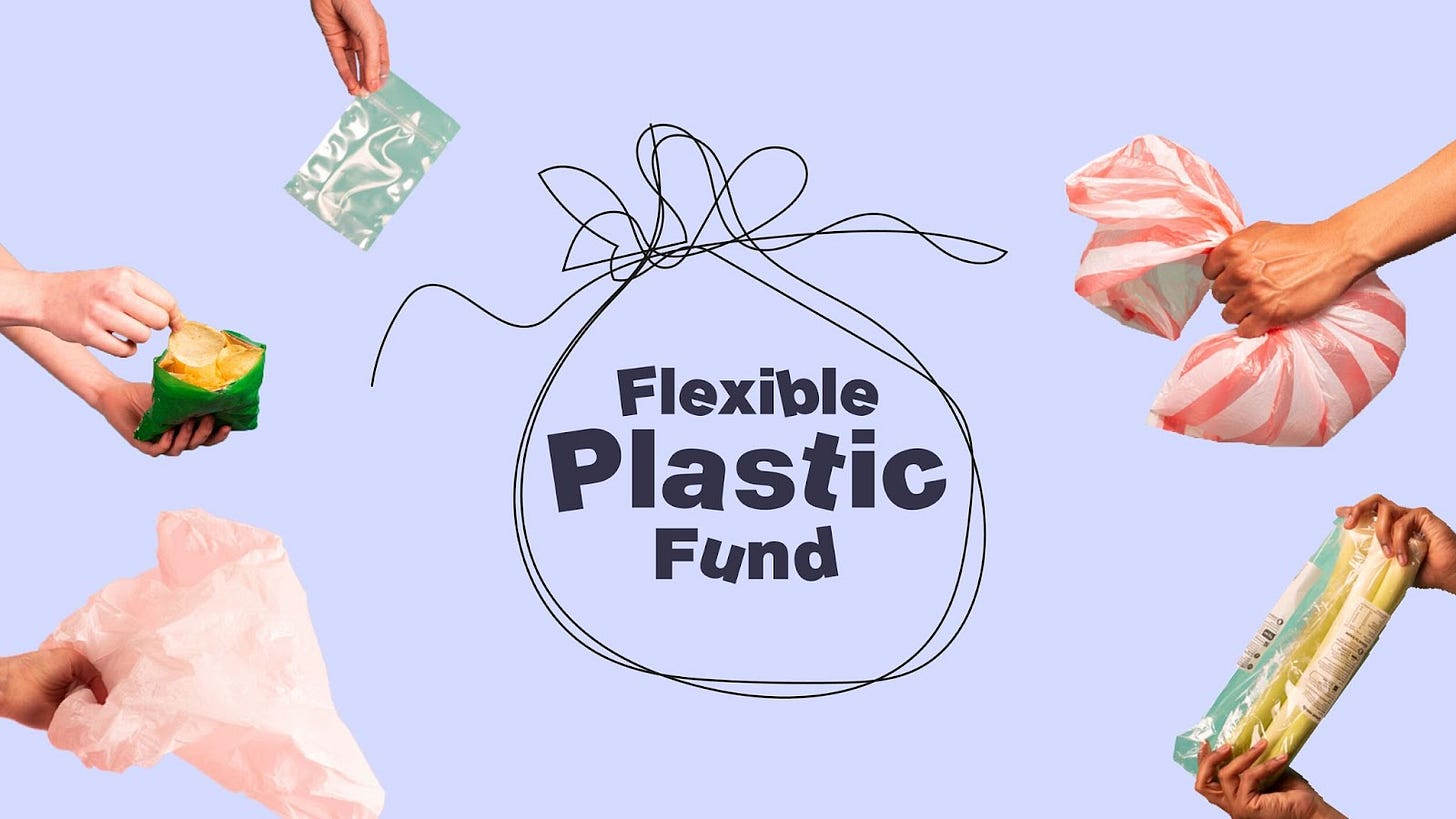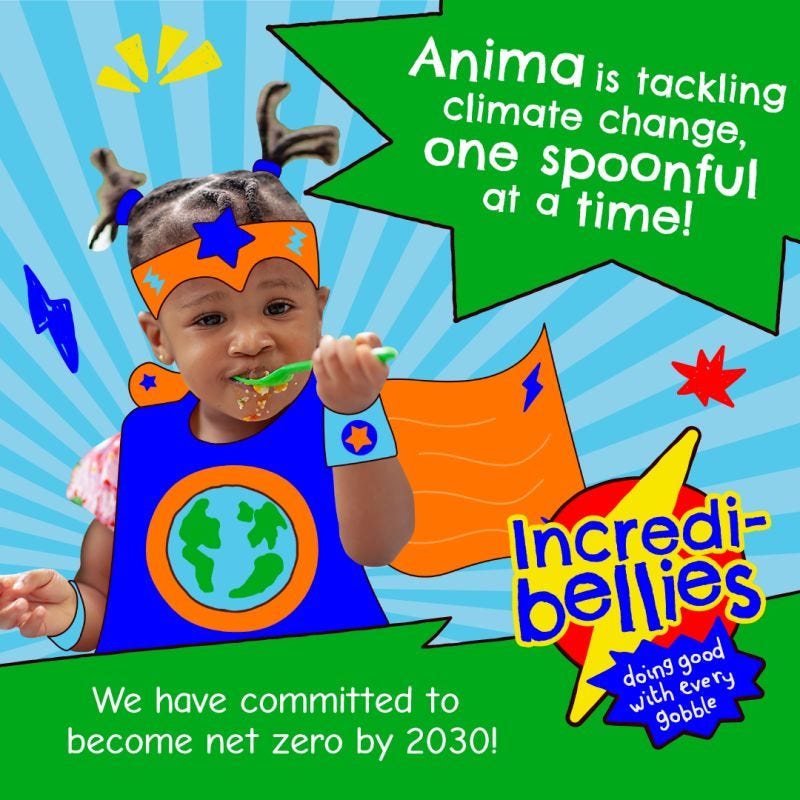🌱 The Flexible Plastic Fund: 5 Steps To Tackle A Problem, with Ella's Kitchen leading the way.
Featuring Ella's Kitchen, Hylo, Karma Drinks, The Collective and more...
Happy Monday!
This week we cover:
Flexible Plastic Fund: 5 steps to tackling one of the UK’s biggest environmental problems
Ella’s Kitchen: 3 big goals to protect little lives.
In case you missed it: Plastic Accounting 101: How Your Brand Can Take Action
> Good News Last Week
🎯 Brewdog launches an Extra Pale Ale in partnership with Rubies in the Rubble, using wonky pears and 100% profits donated to The Felix Project.
🎯 Activewear brand Hylo becomes a certified B Corp, with 104 points.
⭐️ Birds Eye launches The Peas for Bees campaign, to educate consumers on sustainable sourcing and the importance of biodiversity.
⭐️ Heinz and Pulpex to pilot paper-based ketchup bottle made from 100% sustainably sourced wood pulp.
⭐️ Zara introduces a £1.95 fee for returns at third party drop off points, to reduce the environmental impact of ‘last mile’ transport and encourage shoppers to return clothes in-store.
⭐️ PepsiCo brand Lay’s announces innovative project to repurpose heat from crisp factory to heat homes in Veurne, Belgium. Using a condenser, the cooking vapour will be captured to heat water from 50°C up to 80°C - which will then be used in central heating.
⭐️ Ben & Jerry’s announced it is piloting a regenerative agriculture scheme across 15 supplier farms, aiming to cut dairy emissions through low carbon and low methane production processes. The aim? To bring the emissions intensity of their farms to half the US industry average by the end of 2024.
⭐️ Tesco in partnership with WWF has launched ‘Innovation Connections’, a new scheme which pairs start-ups with suppliers to trial and scale new technologies, with the aim to halve the environmental impact of the average UK shopping basket.
⚡️ Starbucks and Hubbub announce the #BringItBackFund for innovative projects which aim to reduce the barriers and increase the uptake of reusables compared to single-use. Up to five projects will each receive grants of between £150,000-£300,000 for a year.
⚡️ Alliance to End Plastic Waste and Lombard Odier have joined forces in a $500m fund, aimed at supporting companies and projects focused on the development of a circular economy for plastic.
> Click on each link to read more.
> Quick Take
Flexible Plastic Fund: 5 steps to tackling one of the UK’s biggest environmental problems
The Flexible Plastic Fund have not given themselves an easy task. They’re facing, head on, one of the most persistent and damaging issues plaguing plastic circularity nation-wide: (you guessed it) ‘Flexible Plastic’. What does this mean?
Typically exclusively meaning PVC (polyvinyl choride), the Fund aren’t picky when it comes to what they’re including as ‘flexible’ plastic - from printed pouches to layered wrappers, they’re tackling it all. Representing almost 22% of all UK consumer plastic packaging, only 6% is currently recycled. Why? It’s tricky to recycle, often wrongly sorted, and needs different machinery to rigid plastic. It’s also less valuable than rigid plastic, so investment in equipment has been less of a priority so far.
Here’s how the Fund is meeting this challenge, and how your brand can join in…
What is the Flexible Plastic Fund?
The Flexible Plastic Fund is led by producer compliance scheme Ecosurety and supported by environmental charity Hubbub. The Fund is already attracting big names, after being created in collaboration with Mars, Unilever and Nestle, and with supermarket giants Sainsbury’s and Waitrose already signed up.
A key principle? It relies completely on collaboration and participation across the UK supply chain - from manufacturers to customers. In their words, “everyone has a role to play in bringing flexi back”. More than this, though, the scheme benefits all parties of this supply chain. It adds a true value to the plastic, incentivising each party to pass it along to the next stage in the chain.
How does it work?
The Flexible Plastic Fund aim to do three things; reduce plastic pollution by incentivising flexible plastic recycling, cut carbon emissions by preventing the use of heavy alternatives to flexible plastics, and ensure flexible plastic can continue to be used to maintain quality and help reduce food waste.
To achieve this, it follows a 5 step process:
Brands invest in the fund to become partners
Retailers host flexible plastic collection points in store for individuals to contribute to.
The plastic is collected, tracked and transformed by a recycler that has been approved by the Environment Agency.
The recycler creates PRNs (packaging recovery notes) for the new products, which act as certificates to prove the plastic has been recycled and also provide price stability by creating a minimum price for the plastic.
After approval, the PRNs are paid for and passed onto brand partners
The Fund’s current aim is to collect 80% of plastic recycled in the UK, crucially rising to 100% by 2023. The plastic is recycled into a variety of products, with the goal to eventually create food-grade plastic film in order to have a ‘fully circular model for flexible plastic’.
How can your brand get involved?
There’s high consumer demand for such a scheme. Recent research from the University of Sheffield found that an incredible 95% of participants would be willing to recycle their flexible plastics. Businesses can’t afford to ignore such a strong customer-led call to action, especially at the dawn of the UK’s Plastic Packaging Tax.
Good news for SMEs? Your financial contribution to the fund to become a partner is based on the volume of products you produce. Take the lead of other consumer goods brands who are starting to step up (like Karma Drinks, Ella’s Kitchen, The Collective and Yeo Valley), by doing the same.
Interested? Read on…
Go straight to the source at the Flexible Plastics Fund
Learn about ‘problem plastics’ from WRAP
Learn about plastics in a circular economy from the Dame Ellen Macarthur Foundation
> Brand Spotlight
Ella’s Kitchen: 3 big goals to protect little lives.
Founded in 2006 to ‘improve children’s lives through developing healthy relationships with food’, Ella’s Kitchen are focusing on children’s futures - both via nutrition and their environmental impact. How? Let’s dig in…
In 2020 they announced their ‘Big Pledge to Little People’, covering three key areas:
To be Net Zero by 2030
To reduce emissions by setting Science Based Targets
To work with conservation partners to restore, rewild + protect the ecosystems
After certifying as B Corp in 2015, they’ve worked hard to encourage their suppliers to do the same via the adapted B the Change programme - helping them report and identify their social and environmental impact. Recently, Delafruit (a manufacturing partner of Ella’s Kitchen) announced that they’ve received B Corp certification (read more here). Understanding that, to achieve their own goals they have to collaborate with others, they’re also members of the Flexible Plastic Fund - encouraging consumers to drop off used pouches and snack wrappers at local participating retailers in a movement they’re calling ‘EllaCycle’. In 2020 (financial year) alone, they’ve recycled 1,194,703 pouches. Proud supporters of the Better Business Act (read more here), and partners with Do Nation to engage their employees in environmental and social action, they’re truly walking the talk for little people. Not stopping there, they’ve also signed WRAP’s Food Waste Reduction Roadmap, aiming to reduce their food waste by 100% by 2024.
The progress on their goals?
In 2020 Ella’s Kitchen announced two conservation charities they’re partnering with: Trees for Life and World Land Trust. With Trees for Life focusing on restoring and rewilding the Scottish Highlands via their Ella’s Kitchen Grove (which they donated all online sales profits from February 2021 to), the World Land Trust works internationally in locations like Ecuador where Ella’s Kitchen are protecting over 15,000 trees.
In October 2021, they announced their Science Based Targets have been approved, a major milestone for any brand - and a key point of progress in their Big Pledge to Little People. Aligning their Scope 1 and Scope 2 targets to the 1.5°C pathway, and their Scope 3 target to the well-below 2°C pathway, they’re aiming for:
Reduction in absolute Scope 1 and 2 GHG emissions by 100% by 2030 from a 2018-2019 baseline.
Reduction in absolute Scope 3 GHG emissions by 28% by 2030 from a 2018-2019 baseline.
Transparent about their progress, on p8 of their most recent ‘Good Stuff We Do’ report you’ll find their ‘Dream Tracker’, chronicling whether a target has been achieved, is on track, behind plan or not met. What environmental targets have been met so far? Our favourites are the following:
Launch a carbon management project by June 2019 to measure, report and mitigate the footprint of their value chain.
Confirm scope and roll out ‘B the Change’ partner programme by June 2019.
Work closely with their value chain to help them measure what matters and improve their environmental and social performance.
Develop and launch Ella’s sourcing standard for banana, mango and vanilla and ensure all suppliers are signed up by June 2020.
Double the number of pouches sent to EllaCycle by June 2021.
With a crystal clear focus on protecting the planet for future generations, it’s no wonder they’re one of the UK’s leading baby food brands.
Support Ella’s Kitchen via their shop:
> In case you missed it
Plastic Accounting 101: How Your Brand Can Take Action
by Noah Godfrey, Co-Founder of Ampliphi.
> Follow up with…
Article: Plastic packaging tax – what your business should be doing?
Podcast: CEO of Ella’s Kitchen, Mark Cuddi on sustainable business at the UK’s No.1 baby food company
Book: Growing A Revolution
Book: The B Corp Handbook: How to Use Business as a Force for Good






